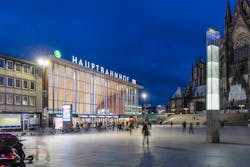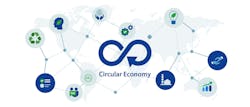How to financially weather the pandemic: Signify provides insights
The coronavirus pandemic is pulverizing the global economy, but certain business activities have been relative bright spots. At Signify, those have included selling to commercial sites deciding to refurbish during the hiatus. The slowdown has also opened a chance for Signify to spread IoT lighting gospel, and to sharpen its own online business processes.
That’s what CEO Eric Rondolat told analysts during a conference call last Friday, during which he also revealed that Signify is cranking up production and development of ultraviolet (UV) lighting for disinfection applications both during and after the coronavirus outbreak, as LEDs Magazine reported.
“We are taking extra measures to manage our performance in the second quarter as we expect demand to be further impacted,” Rondolat said on the call. “We also started to explore new business opportunities arising from the situation, while remaining very close to our customers.”
The food retail trade, which has largely remained open, has been one area where customers have actively continued spending on existing lighting projects, and has also been a source of new revenue in that Signify has been providing it with UV-based systems for disinfecting shopping carts, Rondolat noted.
But supermarkets and the like have not been the only segment spending on lighting during the health crisis.
“In other end segments — office, warehouse, manufacturing plants — when some of the sites are not opened, we see customers that are taking the opportunity to make some refurbishments,” Rondolat said. “They’re small projects, but we see it happening.”
And in the public sector, Rondolat noted that there are “opportunities coming on linked to the development of infrastructure” as governments create stimulus programs. “This is a strong point, because normally we are very well positioned for these opportunities — streets and road, some government buildings,” he said. “We see potential growth there.”
Of course, the overall picture has been one of setback. As LEDs reported, Signify reported a 39.2% decline in income to €27 million ($29.2M) and a 15.3% tumble in comparable sales for the first quarter ending Mar. 31, largely because of the financial consequences of the COVID-19 outbreak.
But the world’s largest lighting company — formerly called Philips Lighting — is taking measures to mitigate the impact. Those include not only focusing on certain products and services, but is has also entailed educating customers on the benefits of “connected lighting,” also known as IoT lighting. Signify and the lighting industry as a whole have been trying for several years to morph into IT providers by convincing customers to make lighting the backbone of information networks that collect and analyze data about building operations.
The industry’s progress in this endeavor has been moderate at best; some would say slow. Rondolat said now is a good time to generate much more IoT lighting awareness.
“Even if customers are not going to make the decision immediately, we take the opportunity of the crisis, as this is a global slowdown, and these customers have a little bit more time to listen to us educate them about connected lighting,” he said, adding that connected lighting performed financially better than other Signify sectors in the quarter.
For Eindhoven, Holland-based Signify, the pandemic has also prompted cost cutting. As LEDs has reported, executives have taken a 20% pay cut, while at the same time offering employees the chance to take a voluntary 20% cut in both pay and workload. Last week, Rondolat said more than 85% of employees have chosen the reduction.
Signify seems to be finding plenty of other areas to trim as well.
“A crisis like this focuses the mind,” new chief financial officer René van Schooten said on the call. He noted that the company has naturally cut the “usual things” like travel and hiring.
“But we go beyond,” he added. “Basically, everything which is an indirect material spend, we ask, ‘Do we need it, do we need it now?’” That has led to delaying product launches, and has affected programs across the company including marketing and research and development.
“Everything is being challenged and either stopped or pushed out,” van Schooten said.
In practical matters, he also noted that the company is keeping tight control of inventory and is closely managing its payables. Receivables have not yet been an issue. “So far, that has actually gone quite well,” van Schooten noted. “We are in close contact with our customers and we are also very confident that we can maintain appropriate behavior from their side relative to paying on time. Our ‘overdues’ hardly increased in Q1.”
The company is also leveraging its recent acquisitions of Cooper Lighting Solutions and of 51% of Zhejiang Klite Lighting Holdings Co., Ltd. to consolidate manufacturing costs and to increase its buying power.
Seizing the opportunity to further get its own house in order, both Rondolat and van Schooten noted that Signify is honing its online processes.
“We keep on investing in our online capabilities,” van Schooten said. Rondolat described it as “the acceleration of our digital transformation.”
MARK HALPER is a contributing editor for LEDs Magazine, and an energy, technology, and business journalist ([email protected]m).
For up-to-the-minute LED and SSL updates, why not follow us on Twitter? You’ll find curated content and commentary, as well as information on industry events, webcasts, and surveys on our LinkedIn Company Page and our Facebook page.

Mark Halper | Contributing Editor, LEDs Magazine, and Business/Energy/Technology Journalist
Mark Halper is a freelance business, technology, and science journalist who covers everything from media moguls to subatomic particles. Halper has written from locations around the world for TIME Magazine, Fortune, Forbes, the New York Times, the Financial Times, the Guardian, CBS, Wired, and many others. A US citizen living in Britain, he cut his journalism teeth cutting and pasting copy for an English-language daily newspaper in Mexico City. Halper has a BA in history from Cornell University.





